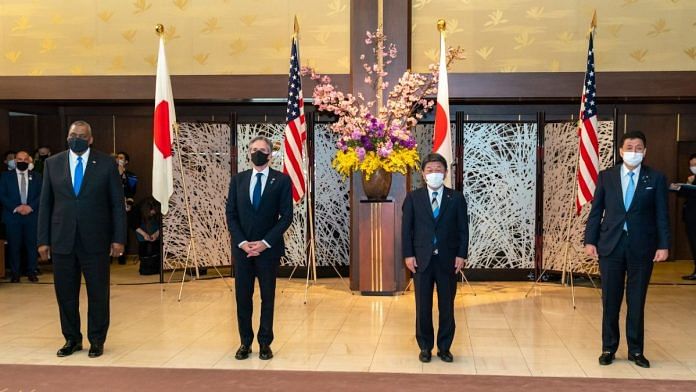New Delhi: The US and Japan have described China’s behaviour as “inconsistent” with the existing international order, and said it presents political, economic, military, and technological challenges to the international community.
The US and Japan made the remarks in the joint statement issued after the bilateral 2+2 dialogue between their foreign and defence ministers in Tokyo Tuesday, , drawing a sharp rebuke from Beijing.
According to the joint statement, the US and Japan discussed China’s “unlawful maritime claims” in the South China Sea, and concerns over the human rights situation in Hong Kong and the Xinjiang Uyghur Autonomous Region.
China’s foreign ministry hit back Wednesday, calling the statement “malicious” and one that “flagrantly interferes in China’s domestic affairs”, and “attempts to harm China’s interests”.
Also read: ‘Anonymous’ author’s paper on US’ China strategy makes a buzz, has sharp message for India
China’s ‘destabilising’ behaviour
The 2+2 dialogue was attended by US Secretary of Defense Lloyd Austin and Secretary of State Antony Blinken and their Japanese counterparts, Defence Minister Nobuo Kishi and Foreign Minister Toshimitsu Motegi.
In a reference to China’s behaviour, the statement said the leaders “committed to opposing coercion and destabilising behavior toward others in the region, which undermines the rules-based international system”.
“They reaffirmed their support for unimpeded lawful commerce and respect for international law, including freedom of navigation and overflight and other lawful uses of the sea,” it added.
The US and Japan expressed concerns about “disruptive developments” in the region such as the China Coast Guard law, which empowers the Chinese Coast Guard to take any measure, even use weapons, when “when national sovereignty, sovereign rights, and jurisdiction are being illegally infringed upon by foreign organisations or individuals at sea”.
The two countries also discussed the US’ commitment to the defence of Japan, “which includes the Senkaku Islands”, under Article V of the US-Japan security treaty. Known as Diaoyu in China, the uninhabited islands in the East China Sea are a subject of conflict between Beijing and Tokyo.
In June 2020, China warned Japan against integrating the Senkaku Islands, and increased its naval presence in the area.
Article V of the treaty states: “Each Party recognises that an armed attack against either party in the territories under the administration of Japan would be dangerous to its own peace and safety and declares that it would act to meet the common danger in accordance with its constitutional provisions and processes.” It also states that all measures taken as a result shall be reported to the Security Council of the United Nations and shall be terminated when the Security Council has taken the steps to restore peace and security.
Peace and stability in the Taiwan Strait, which separates Taiwan from China, was also underscored in the joint statement.
The statement also recalled that the July 2016 award of the Philippines-China arbitral tribunal, constituted under the 1982 Law of the Sea Convention, “is final and legally binding on the parties”. The tribunal had upheld the Philippines’ claims in disputes with China over the South China Sea.
China says Japan has ‘invited wolf into the house’
At a press conference Wednesday, Chinese foreign ministry spokesperson Zhao Lijian said Beijing “deplored” and “rejected” the US-Japan statement.
Zhao made six counterpoints. First, China said there is only one system governing international relations — the UN-centred international order — and the US and Japan are not entitled to impose their standards on others. Second, that China is the largest contributor of peacekeepers among all the permanent members of the UN Security Council while the US indulges in “double standards and cherry-picking” when it comes to international law and maintaining peace and security.
Third, China said, issues concerning Taiwan, Hong Kong and Xinjiang are China’s domestic affairs. Fourth, the US and Japan are still stuck in the “Cold-War mentality”, seeking bloc confrontation and trying to form an “anti-China circle”, it added. Fifth, Japan has “invite[d] the wolf into the house” and betrayed the collective interests of the region, it said. Finally, China said it will take all measures necessary to defend its sovereignty, security and development interests.
Edited by Sunanda Ranjan
Also read: India and US must know the new Cold War is a different beast – China isn’t USSR



